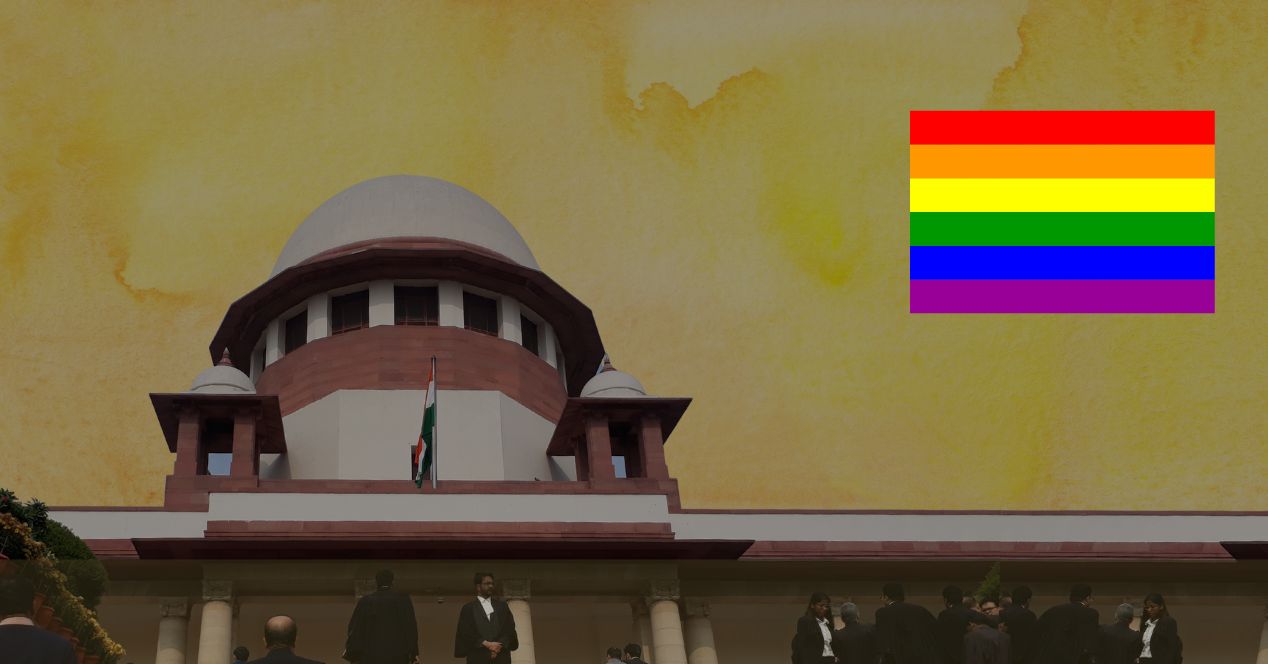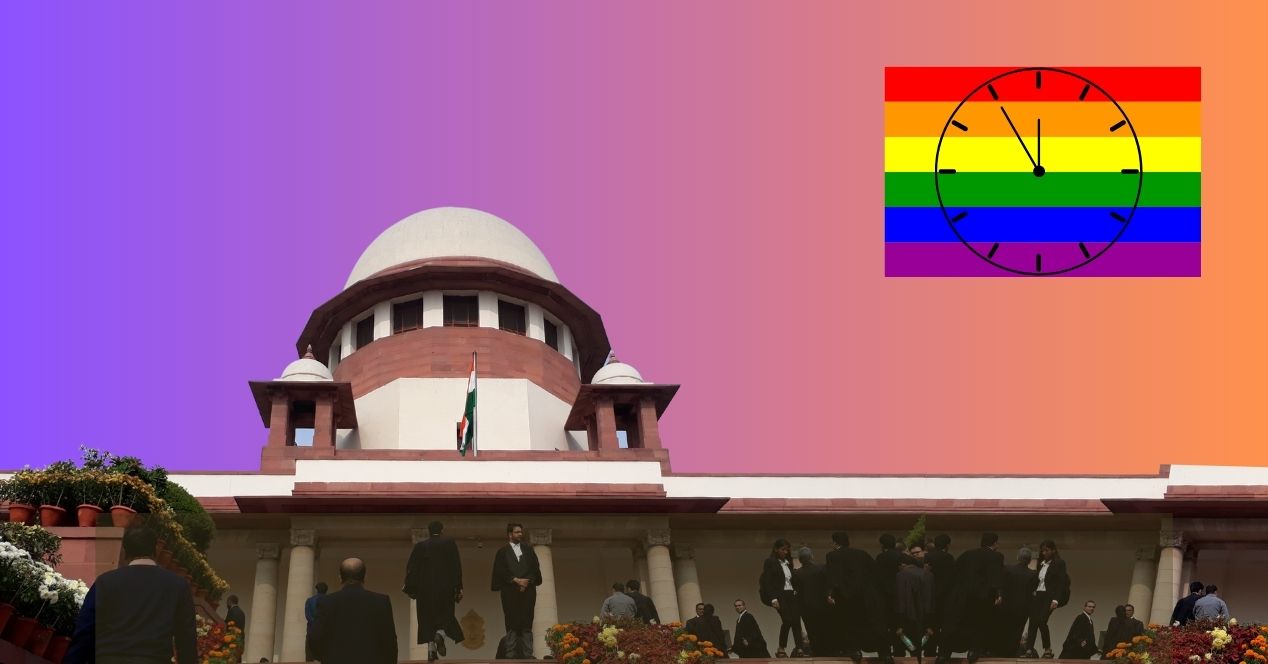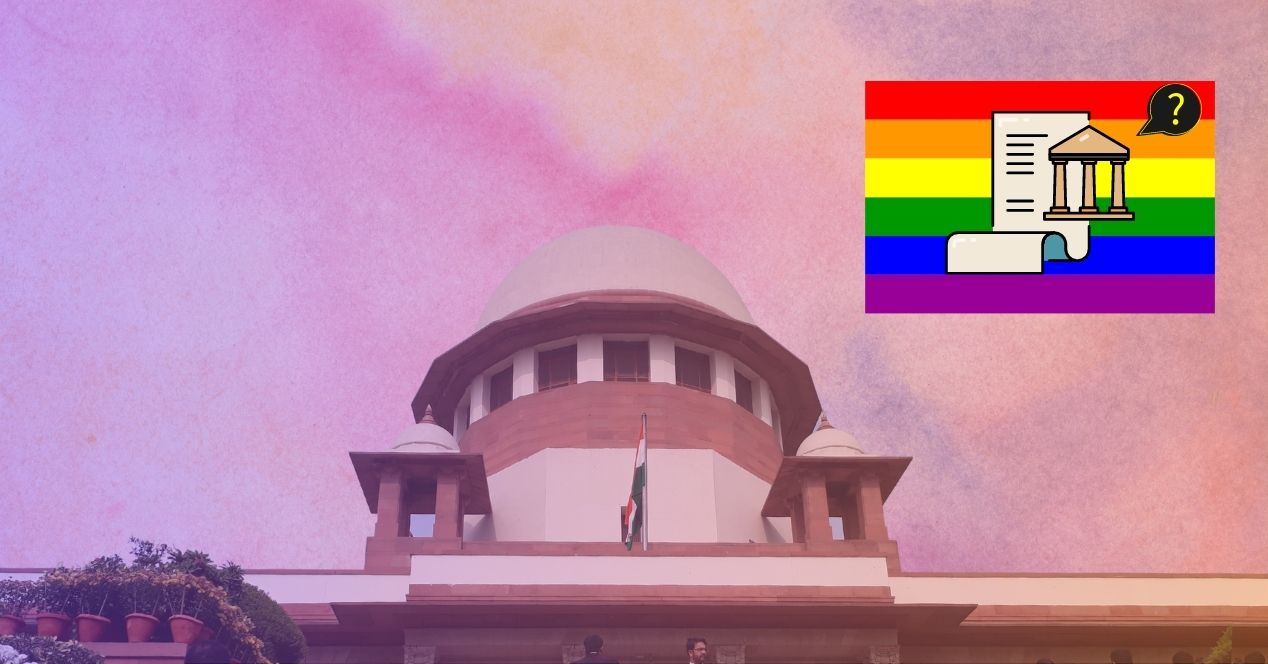Plea for Marriage Equality: Constitution Bench Day #7
Plea for Marriage EqualityJudges: D.Y. Chandrachud CJI, S.K. Kaul J, Hima Kohli J, S.R. Bhat J, P.S. Narasimha J
Today, Solicitor General Tushar Mehta concluded his arguments against the recognition of marriage equality for LGBTQIA+ persons.
Last week, the SG argued that the petitioners were essentially asking for the provisions of the Special Marriage Act, 1954 (SMA) to be rewritten to suit a particular class of individuals (the LGBTQIA+ community).
The Bench had also asked the SG to confer with various Union ministries to determine what protection can be afforded to LGBTQIA+ couples to level the playing field with married couples. Mr. Mehta returned with those findings today.
Background
On November 14th, 2022, two same-sex couples filed writ petitions in the Supreme Court seeking legal recognition of same-sex marriages in India. The petitions were centred around the constitutionality of the Special Marriage Act, 1954 (the Act).
The petitioners argued that Section 4(c) of the Act only recognises marriage between ‘male’ and a ‘female’ persons. This discriminates against same-sex and other queer couples by denying them the same matrimonial benefits as heterosexual couples.
According to petitioners, the non-recognition of same-sex marriage violates the rights to equality, freedom of expression and dignity. They claimed that the SC’s judgements in NALSA vs Union of India (2014) and Navtej Singh Johar vs. Union of India (2018) recognised non-binary gender identities and guaranteed equal rights to homosexual persons. However, since no law regulates queer marriages, queer couples are denied the practical benefits that flow out of marriage such as inheritance, insurance, adoption, etc.
On March 12th, 2023, the Union filed a Counter Affidavit opposing same-sex marriages. They claimed that ‘the notion of marriage itself necessarily and inevitably presupposes a union between two persons of the opposite sex’.
On March 13th, 2023, a 3-Judge Bench led by CJI D.Y. Chandrachud referred the case to be heard by a 5-Judge Constitution Bench as it involved constitutional as well as statutory questions of law.
Solicitor General Suggests Creating a Committee to Address Administrative ‘Tweaks’
Mr. Mehta informed the Bench that he spoke with various Union ministries and suggested the creation of a committee. This committee will address administrative changes to address the concerns of the LGBTQIA+ community. This committee will be head by a Cabinet Secretary. The Bench asked the petitioners to submit a list of issues that they believe the Union should address.
The petitioners agreed to this suggestion. However, Senior Advocate Dr. Singhvi highlighted that they were seeing large-scale changes to the law. While administrative changes are welcome, they are not a substitute for the reliefs that the petitioners are seeking. CJI Chandrachud responded stating that the Union in their arguments accepted that LGBTQIA+ people have the right to co-habit. Beyond that, the Union can also resolve practical issues regarding housing and banking benefits, among other things.
Sr. Adv. Dr. Maneka Guruswamy objected, stating that this measure misses the point. Rights are a proactive positive enactment recognised by the law. For simple rights as a pension or provident fund, marriage is essential.
The Bench clarified that they would still be deciding the conceptual issue in this case i.e. whether LGBTQIA+ persons have the right to marry under the SMA. The administrative measure of forming a committee is something that must take place regardless of how the case is decided. Justice Bhat acknowledged that it may not be the substantial gain they were seeking, but it is still a ‘building block’ for the future. CJI Chandrachud stressed that they didn’t want to close off other options if marriage equality is not recognised.
SG Mehta: Right to Marry is not a Fundamental Right
Mr. Mehta argued that there are a whole host of relationships that the State does not regulate as there is no ‘compelling State interest’ in doing so. Marriage has implications for childcare, alimony, and the stability of the family unit. Hence, there is a State interest and the law must regulate the contours of marriage.
He then argued that the petitioners mistakenly relied on the cases of Shafin Jahan v Ashokan K.M. (2018) and Shakti Vahini v Union of India (2018) to explain the existence of the fundamental right to marry. In both cases, The SC was not considering marriage as an abstract, but in the context of the case. Neither case dealt with the rights of non-heterosexual couples.
In Shafin Jahan, the Court recognised a legitimate relationship and the right to marry between a Muslim boy and a converted Muslim girl despite familial objects. In Shakti Vahini, the Court was dealing with non-State actors (Khap Panchayats in this case) hindering the choice of a woman to marry a man of her choice.
CJI Chandrachud clarified the petitioners arguments in response. The petitioners are not saying the State has a duty to recognise all relationships. They are saying non-recognition would be to deprive them of societal benefit, which is discriminatory. Mr. Mehta reiterated that the SMA was based on a reasonable classification and only applied to heterosexual couples.
Finally, Mr. Mehta referred to Schalk and Kopf v Austria (2010). This is a decision from the European Court of Human Rights (ECHR) dealing with Article 12 of the European Convention which recognises marriages solely as a heterosexual Union. The decision states that the ECHR cannot compel States to recognise same-sex marriages. Each nation has different, deep-rooted social and cultural conditions which must be addressed by national law.
Attorney General R. Venkataramani Cautions Bench Against ‘Altering’ SMA
The Attorney General repeated many of the Solicitor General’s submissions on certain key points. He argued that the SMA was meant to facilitate inter-faith and inter-caste marriages and only saw marriage as a heterosexual union. As it only facilitates marriage, it cannot be a discriminatory statute. It also cannot be called ‘under-inclusive’ as it was drafted when only heterosexual couple could get married. LGBTQIA+ persons and their relationships were never expressly excluded and reading them in would be introducing an ‘alien intent’ into the law.
He also repeated that the Court could not re-write the SMA as that would breach the separation of powers between the SC and Parliament. This would violate the basic structure of the Constitution.
Sr. Adv. Rakesh Dwivedi: The SC Cannot Force a Societal Change
Mr. Dwivedi appearing for the State of Madhya Pradesh argued that certain provisions of the SMA interact with other laws of the country like the IPC. For instance, the punishment for bigamy under the IPC specifically refers to a man. Therefore, the words ‘husband’ and ‘wife’ used in the SMA could not be changed to ‘spouse’ without affecting other laws. Further, the SMA was enacted specifically to recognise heterosexual marriages. Therefore, the original intent of this law could not be ignored by the SC unless under rare circumstances.
Mr. Dwivedi also suggested that changing the provisions of the SMA to uphold the dignity of LGBTQIA+ couples is detrimental to the dignity of heterosexual couples. CJI Chandrachud was quick to enquire how this is the case. Mr. Dwivedi stated that marriages were meant for heterosexual men and women and had historical significance. Altering this meaning would diminish that significance.
Further, Mr. Dwivedi claimed that laws could not be changed without the acceptance of society. Parliament was the most appropriate authority to make changes to laws as and when required as it knew the pulse of the people. Moreover, he argued that homosexuality was decriminalised less than five years ago, therefore, there was no immediate need to recognise homosexual marriages as well. Society had to evolve to accept these marriages and more debate was needed. He said when there is a fight for a cause, it could not be won overnight. Change had to happen in phases and right now, the majority did not want legal recognition of non-heterosexual marriages and the SC could not force a change on society. ‘All causes take time to succeed. All causes have martyrs’ he remarked.
Mr. Dwivedi will continue his arguments next Tuesday (May 9th, 2023).



